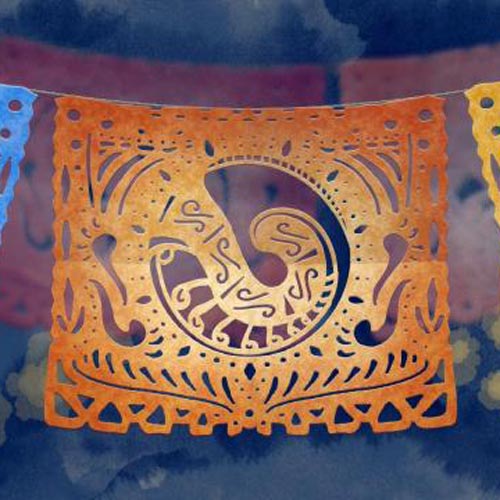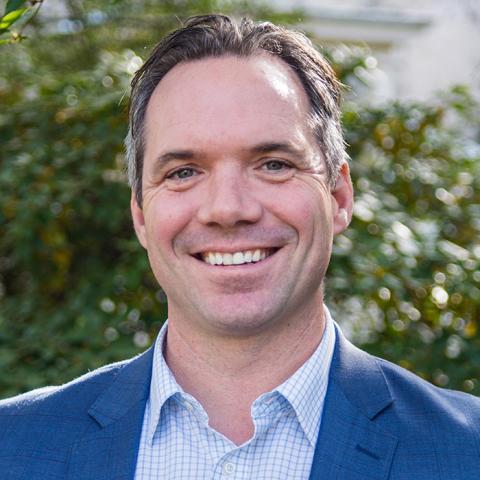Appreciation, Outputs, and Outcomes. CPGC 2022 in Less than 1,500 Words

Image: A Close-Up of Papel Picado. Professor Brook Lillehaugen shared strings of Papel Picado with CPGC Staff Members following another successful summer collaborating with the Ticha Project in Oaxaca, Mexico.
Details
We started 2022 uncertain whether we would be permitted to fund students completing place-based international internships. We ended the year with a capacity-building trip to the Middle East. 2022 was, for the Center for Peace and Global Citizenship, a year of stepping into challenges, acting beyond expectations, and fulfilling the College’s core commitments to better learning for broader impact.
In January, we began by grounding ourselves in the intellectual traditions and place-based relationships we inherit. We remembered MLK by supporting a dialogue with Professors George Lakey (retired, Swarthmore) and Terrance Wiley (Religion, Haverford). The audio recording of the event demonstrates the depth and breadth of Lakey’s work with applied nonviolent direct action, while Wiley, in a single comment, clarifies how historical and transnational acumen can help us all understand our inheritance of relationships across justice networks today. He said to Lakey,
“I was thinking about all of the different people that have been inspirational to me, in addition to you, that you’re connected to. It’s just profound. And the Frederick Douglass quote had me thinking about my class earlier this week talking about Frederick Douglass as the only African American representative at Seneca Falls in 1848. And a couple years later, Henry David Thoreau, inspired by the upheaval of 1848 across the globe, writes an essay on civil disobedience that Elizabeth Peabody publishes and - you have [William Lloyd] Garrison of course bringing Frederick Douglass into the abolitionist movement, inspiring an older Tolstoy to deepen his radicalism and Tolstoy of course ends up with a farm named after him, by Gandhi, in South Africa. And would later write his last letter, to Gandhi and - that of course connects us to King, and Rustin more importantly … by the 1940s people were calling Rustin, “America’s Gandhi.”
And here, at Haverford, we are situated less than twenty miles from Rustin’s childhood home in a Quaker household in West Chester; less than fifteen miles from the site of King’s graduate studies at Crozier Theological Seminary; and less than ten miles from the site where King first heard a lecture on Gandhian nonviolence, at First Unitarian Church in Philadelphia. Wiley’s book, Angelic Troublemakers, and other vital transnational scholarship such as Nico Slate’s Colored Cosmopolitanism help us situate our own understanding and justice work within long, global traditions of disciplined inquiry, organizing, and activating.
In February we continued the focus on place-based understanding, community-building, and structural change with an event co-created through conversation with several Ardmore community organizations and leaders, along with Haverford faculty and classes, Ardmore and the College - Archives and Experiences. The full recording, including a robust conversation among diverse generations of community members and Fords, and featuring presentations from Villanova Professor Craig Bailey and Ardmore Community Members Barbara Mosely and Regina Short, is available at the link.
In March we announced our class of fifty-six Summer 2022 CPGC Fellows. Fellows come from a breadth of majors, interning internationally (40%), in the Philly Region (40%), and elsewhere in the US (20%), and represent greater racial diversity and inclusion of first generation students than the College population as a whole.
April included our annual orientation to summer fellowship experiences, with an increased focus on outputs, outcomes, and consideration of the UN Sustainable Development Goals. Later that same month, we hosted faculty-nominated student presentations of publicly-engaged Scholarship. Students chosen as this year’s publicly engaged scholars (receiving a financial award and recognition in commencement materials) were Pelagia Majoni ‘22, for ongoing work in Africana Studies and Computer Science contributing to expanded access to computer and science education in Zimbabwe, and Lulu Obaditch ‘22, for the thesis, “Political Isolation: Long-Term Solitary Confinement & State Repression of Black Radical Dissent.”
In May, we kicked off our annual Philadelphia Orientation Program, thrilled to be back to a truly place-based, applied, in-person opportunity to visit with community-conscious investors and gardeners, decarceration leaders and policy influencers, public health and community inclusion professionals, and activist artists and restaurateurs. May also saw a return to engaged language activism and organizing in Oaxaca, Mexico, through the Ticha Project (which we co-fund) and celebration of ongoing partnership between the Spanish Department and the New Sanctuary Movement of Philadelphia, which we also support, in addition to the award of a new grant from the Stevens Initiative, supporting online global learning connecting students in the United Arab Emirates with students at Haverford.
As the summer began, internships took center stage. While fifty-six students took part in robust internships all around the world, College Communications was able to highlight a student working with Common Cause Combatting Mass Incarceration, as well as students Supporting Asylees and Refugees with HIAS-PA, and Serving Philadelphia’s Latinx Communities at Puentes de Salud.
Upon return to campus for the fall, the CPGC sponsored a conversation among applied scholars from American University - Sharjah, Moravian, and the University of Pennsylvania: Peacework in the Shadow of 9/11: Intellectual and Applied Action. Facilitated by Peace, Justice, and Human Rights Concentration Faculty Member Sarah-Jane Koulen, the event emphasized the day-to-day, community-building work of peacemaking in business, education, and civic and religious communities.
As September shifted to October, the CPGC was honored to play host to a statewide conference focused on sustainability, inclusion, and global Learning, Building Belonging: Advancing a Global and Inclusive Pennsylvania. Attended by more than 100 educators and administrators from across the Commonwealth, the event supported and challenged attendees who are developing and extending connections between educational institutions and more just, inclusive, sustainable communities. The following week we cooperated with the Political Science Department to host a panel of distinguished alumni and elected officials organizing and advocating for a more just and inclusive democracy. As the month drew to a close, the CPGC Ignite Talks and Poster Fair were part of family and friends weekend, with dozens of students sharing posters and five students being featured (following nominations by their peers) in Ignite Talks about their summer internships. The 5-minute Ignite Talks, with audio and slide deck accompaniment, can be viewed here:
- Ahlam Houssein ‘24, Biology; Health Studies; Neuroscience, interned with the African Family Health Organization, summarized here: https://vimeo.com/775881434/451d2d140f
- Maya Johnson-Fraidin ‘24, History of Art; Gender and Sexuality Studies; Mathematics, interned with The Burke Museum and the National Nuclear Commission, summarized here: https://vimeo.com/775881564/1c906f9e3c
- Catherine Tomson ‘23, History; Health Studies, interned with the Caribbean Community in Philadelphia (CCP), summarized here: https://vimeo.com/775881815/f44a298329
- James Wayman ‘25, Political Science, Spanish, interned with Beyond Borders, summarized here: https://vimeo.com/775882017/fc883c5db9
- Jean Wriggins ‘24, Political Science, Spanish, interned with Grupo de Apoyo Mutuo (GAM), summarized here: https://vimeo.com/775882306/4c62598b6d
In November, Felix Rosado, co-founder of Let's Circle Up, teamed with Anthony Marqusee ‘16 to co-lead a workshop on Restorative Justice. The CPGC also launched its first early application deadline for summer 2023 fellowships, receiving several excellent submissions for Summer 2023 by November 30. Throughout the entire year, the CPGC has been working with students and justice organizations to develop and expand the Philadelphia Justice and Equity Fellowship (PJEF), an ongoing internship and professional development opportunity, throughout the academic year, focused on working with a breadth of organizations advancing inclusion and anti-racism in the Philadelphia Region.
In early December we hosted a PJEF networking event at the Friends Center in Center City, including current students, alumni, and numerous community and organizational partners. Shortly thereafter, our international partnership opportunities in the Middle East expanded thanks to a capacity-building visit there, supporting our efforts to connect students with humanitarian engagement opportunities in Jordan and beyond.
As the year draws to a close, we are profoundly grateful for the alumni who make these opportunities possible through their philanthropic commitments, the community organizations and foundations who commit to justice work everyday, and the students, faculty, and staff members who opt-in to challenging yet vital justice work.
This post, while it captured much of our work, leaves out as much or more than it kept in. Omissions are not intentional; we look forward to continuing to grow with and share about CPGC-supported faculty and student efforts to advance community-engaged learning in the year to come.
As we head into 2023, we are excited to be hosting, “Creative Maladjustment and Youth-led Social Change,” on MLK Day, and hope to see many of you there. Current students: our application deadline for Summer 2023 Fellowships is February 12.
Thank you for your partnership, your collaboration, and your commitment to critically-informed, intellectually rigorous, applied work for more just, inclusive, sustainable, and peaceful communities.




